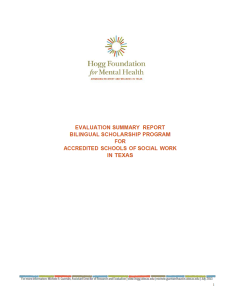Evaluation: Bilingual Scholarships
Increasing Cultural and Linguistic Competency in the Mental Health Workforce
The Hogg Foundation introduced the Bilingual Scholarships for Mental Health Workforce Diversity in 2008 to increase cultural and linguistic diversity in the Texas mental health workforce. The statewide program was the first of its kind in Texas. The foundation committed up to $1 million over three years to fund full-tuition scholarships for Spanish-speaking graduate social work students at 12 Texas universities accredited by the Council on Social Work Education. So far, 109 students have received the scholarships.
Dr. Cheryl Sawyer of the University of Houston-Clear Lake has evaluated the implementation and outcomes of the program. The evaluation involved collecting information from staff and faculty involved with the programs, as well as from current and former students who received the scholarship. Evaluation goals included the following:
- Capturing lessons learned about the recruitment and selection process at each school from faculty, staff and students
- Gathering qualitative feedback from students regarding their experiences of being part of the scholarship program
- Discovering the extent to which students are delivering services in Spanish in fieldwork experiences and in post-graduation employment
Download the evaluation summary report here.
